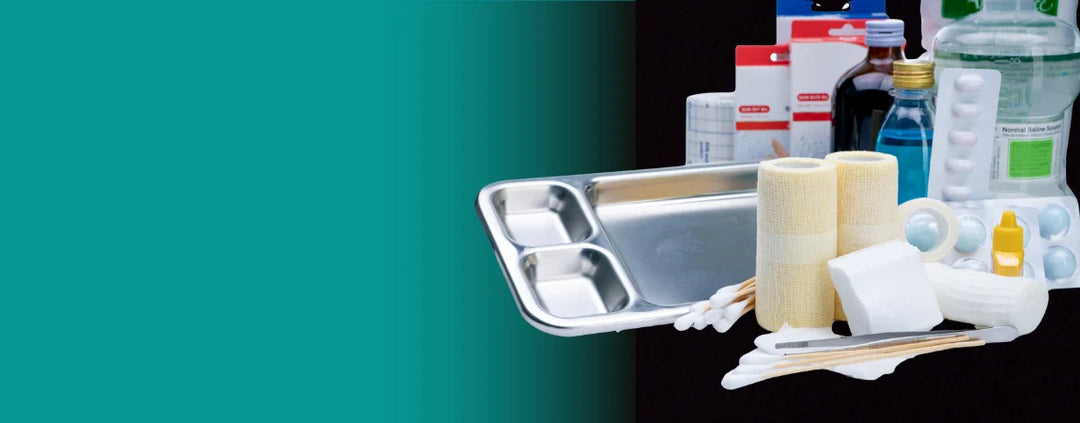People of any age can scar as a result of wound healing, but not everyone’s scar looks the same throughout the course of their lifetime. While scarring always follows the same wound healing process, age can play a vital role in the formation of abnormal or aggressive scar types. It is commonly thought that as we age, our skin becomes weaker and more prone to injury and scarring. While this is one part of the story, it doesn’t reveal the full picture. It may surprise you that children and adolescents are at higher risk for severe scarring, but probably not for the reasons you think.
Continue reading to learn more about scarring in the different stages of life and what you can do to treat them.
The wound healing process is the same no matter your age, so it’s important to observe good wound healing practices to minimize scarring. Because older adults heal at a slower pace, they should be wary of the wound becoming infected. The best way to prevent wound infection is to gently cleanse the damaged skin with a mild soap and running water. A bandage or gauze can be used to protect the wound from pathogens and other contaminants. A bandage should be changed at least once a day if it becomes dirty or wet. Children who attain a wound have a different cause for concern—they are at higher risk for wound reopening due to their high activity levels. Furthermore, it’s not uncommon for children to pick at their scabs, thus exacerbating the wound healing response. Educating your child about wound healing can go a long way in reducing the risk for complications. Adolescents on the other hand may have to deal more with scars caused by severe acne. Cystic acne, for example, is marked by large, painful boils on the surface of the skin. Teens should be informed that popping or picking their acne can result in the formation of atrophic (sunken) scars on the face, chest, or back.
Continue reading to learn more about scarring in the different stages of life and what you can do to treat them.
Age-related risk factors of scars
In one sense, we can say that children and adolescents are more prone to scarring because they are at higher risk for injury due to being more active and engaging in risky behavior. While a person’s lifestyle choices can certainly be a factor in how frequently they attain wounds and scars, we are talking more about biological factors in this article. Observation and research shows that the skin of older people heals at a slower pace, but with less scarring than the skin of younger people. One reason for this may be that younger people have a greater amount of a certain protein that’s released in the blood, called stromal-derived factor 1 (quite a mouthful). Essentially, this protein is driven by fibroblast activity and plays a role in skin cells in addition to many other bodily functions. Another factor responsible for this difference in wound healing may be that skin becomes thinner as we age. After about age 20, the skin starts producing less collagen, leading to the normal signs of aging such as wrinkles and fine lines.The wound healing process is the same no matter your age, so it’s important to observe good wound healing practices to minimize scarring. Because older adults heal at a slower pace, they should be wary of the wound becoming infected. The best way to prevent wound infection is to gently cleanse the damaged skin with a mild soap and running water. A bandage or gauze can be used to protect the wound from pathogens and other contaminants. A bandage should be changed at least once a day if it becomes dirty or wet. Children who attain a wound have a different cause for concern—they are at higher risk for wound reopening due to their high activity levels. Furthermore, it’s not uncommon for children to pick at their scabs, thus exacerbating the wound healing response. Educating your child about wound healing can go a long way in reducing the risk for complications. Adolescents on the other hand may have to deal more with scars caused by severe acne. Cystic acne, for example, is marked by large, painful boils on the surface of the skin. Teens should be informed that popping or picking their acne can result in the formation of atrophic (sunken) scars on the face, chest, or back.
Clinically-proven scar treatment
Medical-grade silicone gel for scars is the only clinically-proven topical treatment for the prevention and reduction of keloids and hypertrophic scars. Silicone gel is hypoallergenic and safe for all ages and skin types. While silicone treatment is most effective on recently-attained scars, silicone is also effective in the management of older scars. Silicone gel works through the mechanisms of hydration and oxygen to create an optimal healing environment at the scar site, also known as homeostasis. There are a variety of ways to use medical silicone, including silicone gel sheeting, silicone scar sticks, and ointments. These products and many others can be purchased through your physician or online at biodermis.com.Biodermis is an innovative market leader with 30 years of expertise in the medical silicone industry. Visit Biodermis.com today to explore a complete range of scar management and post-operative care solutions.
PHYSICIANS AND MEDICAL PROFESSIONALS: REFER OR RESELL?
Biodermis offers custom tailored referral programs designed to simplify and reduce the cost of your patients' post-op care. Additionally, we offer professional pricing if you opt to retail our products. Give us a call at 800.322.3729, and we will be happy to provide additional details on these programs.



